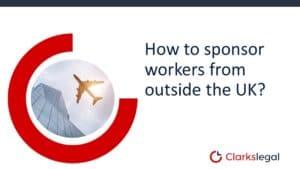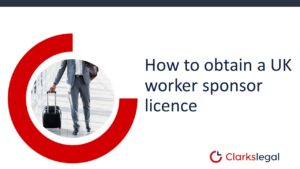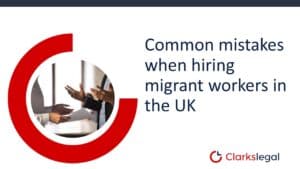Right to work checks
The Home Office’s prevention of illegal working applies to all UK employers regardless of whether they sponsor migrant workers.
As of 13 February 2024, if found to be employing illegal workers, employers face civil penalties for breaches of illegal working regulations increased for First-time offences to £45,000, while repeat or significant breaches will result in fines of £60,000 per illegal worker, criminal sanctions and restrictions on sponsoring overseas workers.
If you are a licensed sponsor or applying to become a sponsor, you are at a particularly high risk of UKVI conducting an immigration audit on your business. Failure to comply with immigration laws and sponsor duties could lead to your sponsor licence being revoked in addition to being levied with multiple civil penalties. This inevitably will cause disruption to your business and could damage your business reputation.
As part of our service we provide our business immigration clients, we often visit client premises to review their business’s methods of conducting right to work checks and provide a detailed report highlighting areas of concern. This helps clients understand which areas they can improve on and to correct issues which if left could lead to costly penalties in the future.
Compliance Training
To avoid any Home Office enforcement action, employers must carry out the prescribed right to work document checks in accordance with UKVI’s guidance. If UKVI immigration officers visit your premises and find you are employing or have employed an illegal worker in the past, a statutory excuse is established if you can show that you conducted right to work checks.
HR and those with responsibility for recruitment should have a thorough understanding of their right to work obligations, including the monitoring of visa expiry dates and appropriate follow-up checks. Our business immigration lawyers are often instructed by businesses to provide comprehensive training to key personnel and HR staff to ensure they are aware of not only what documents they need to check but also how to identify false documents and how to maintain a proper record.
Our lawyers regularly provide seminars and training sessions aimed at helping HR staff understand how to carry out prescribed document checks correctly.
Challenging UKVI Civil Penalty Notices
Recent changes in immigration laws demonstrate the Government’s tough attitude towards illegal working. Responding on time to a Home Office Information Request can reduce a penalty by £5,000 and avoid revocation of a Sponsor Licence.
Our immigration lawyers have a proven track record for successfully avoiding civil penalties. If you have received a Civil Penalty Notice, you will be given the chance to object within 28 days – it is always worth seeking legal advice as you may have a legitimate defence.
“The team makes it very easy to ask questions and understand the advice given.”
Legal 500
How to conduct UK Right to Work Checks
Strengthen Your Business Right to Work Audit
Our audits are a preventative measure, ensuring your business is compliant with UK immigration law.
Our audit includes:
- Ensure relevant changes in ULVO and Right to Work guidance have been implemented into company policy
- Test the effectiveness of recruitment, onboarding and employee monitoring processes
- Identify the changes required to your employment contracts and employee handbook.
- Review HR policies and procedures, specifically recruitment, right to work checks and visa expiries
- Evaluate and comment on a sample of employee files, both for settled and non-settled workers
(Choose between Remote Audit or Onsite Audit)
Protect Your Business Right to Work Training
Our training is designed to equip your team with the essential skills to ensure compliance with UK immigration law.
Our training includes:
- Understanding Right to Work Check forms
- How to carry out all types of Right to Work Checks
- Review documents cut-off dates following the end of the EU Settlement Scheme and the adjusted rules during the recent pandemic
- Understanding Right to Work rules for employees with Student / Tier 4 (General) Student visas
- Identifying false/fraudulent Right to Work documents
- When and how to use the Employer Checking Service
- How to terminate on Right to Work grounds avoiding discrimination claims
Right To Work Checks
Right to Work Checks were introduced under the Immigration, Asylum and Nationality Act of 2006, and are a core component of UK employers’ duties. Businesses are required to meet various obligations to comply with legislation governing the prevention of illegal working. The 2006 Act replaced section 8 of the Asylum and Immigration Act 1996 (the 1996 Act) in respect of employment commencing on or after 29 February 2008.
As an employer, to check that an employee’s share code is valid, you can visit the official government website and use the online service provided. You will need the share code provided by the individual you are checking and their date of birth to access and verify their right to work status.
The duration of a right to work check can vary. In most cases, the online check is instant. However, in some circumstances, it might take longer if additional verification is needed, such as contacting the Home Office. Employers are advised to carry out the check well in advance of the individual’s start date.
The details required for a right to work check include the individual’s name, date of birth, passport and the share code provided. Employers should document the results of the check and retain this information securely for throughout the individual’s employment and for 2 years after.
No, a UK driving licence does not prove the right to work. It is not an acceptable document for this purpose.
Yes, employees may use their BRP to generate a Right to Work share code via the online RTW service which they should then provide to their employer, which they will use to verify the individual’s right to work in the UK.
Individuals can check their right to work status by using the online service on government website.
A RTW document is any document that evidences an individual’s legal right to work in the UK. This can include documents such as British/Irish passports, Biometric Residence Permit (‘BRP’), or other specified documents.
Right to work checks are important to ensure compliance with UK immigration laws and to prevent the employment of individuals who do not have the legal right to work in the country. Failing to conduct proper checks can result in legal consequences for employers.
It is a legal requirement for employers to ensure that their employees have the right to work in the UK. This helps prevent illegal working and ensures compliance with immigration laws.
A Right to Work check is a process employer in the UK must undertake to ensure that their employees have the legal right to work in the country. This involves verifying and documenting the individual’s immigration status.


